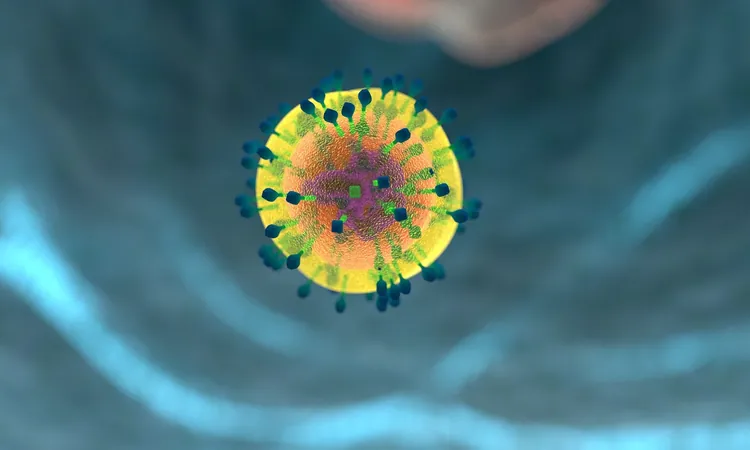
Breakthrough in Alzheimer’s Research: Neuroscientist's Innovative Approach Leads to Promising Clinical Trial
2024-12-23
Author: John Tan
Neuroscientist Gary Gibson's Research
Neuroscientist Gary Gibson, Ph.D., has made significant strides in the fight against Alzheimer’s disease, a condition affecting millions worldwide. His work has culminated in a nationwide clinical trial aimed at treating early stages of Alzheimer's by addressing a potentially overlooked cause: a deficiency in vitamin B1, or thiamine.
Shifting Focus in Alzheimer's Research
For years, Alzheimer’s research has largely centered on the well-known amyloid plaques and tau protein tangles, believed to be indicators of neurodegeneration. However, Dr. Gibson's groundbreaking hypothesis suggests that a lack of thiamine influences how mitochondria in brain cells metabolize glucose, which in turn leads to neurodegenerative changes. His decades of dedicated research have led to the initiation of a phase 2A-2B clinical trial named Benfoteam, set to enroll 406 patients aged 50 to 89 across 50 sites in the U.S.
The Role of Thiamine in Alzheimer's Disease
Dr. Gibson's insights are built upon findings dating back to the 1930s, highlighting the dangers of thiamine deficiency. He contends that this deficiency may not only be a consequence of Alzheimer’s but a pivotal factor that may lead to the development of the disease itself. By restoring thiamine levels, Gibson hopes to tackle one of the root causes of Alzheimer’s, contrasting with current therapies that address symptoms but do not rectify the underlying processes at play.
Innovative Treatment: Benfotiamine
The key to this innovative approach is a synthetic oral drug known as benfotiamine, a precursor to thiamine that can significantly boost the vitamin's levels in the body. Remarkably, benfotiamine elevates thiamine concentrations by a factor of up to 100, potentially reversing harmful glucose utilization processes in the brain's mitochondria. Preclinical research with benfotiamine already showed success in mitigating typical Alzheimer's-related features, including impaired cognitive function and oxidative stress.
Promising Previous Studies and Funding
Gibson's previous pilot study in 2015 yielded promising results, showing that patients receiving benfotiamine experienced less cognitive decline compared to those on a placebo. This pivotal trial garnered a $45 million grant from the National Institute of Aging to support further research based on these encouraging outcomes.
Upcoming Clinical Trial Details
As the larger study kicks off in April 2024, the research team, which includes esteemed colleagues from institutions like the University of California San Diego, Columbia University, and the University of Cambridge, will utilize cutting-edge blood biomarker techniques to monitor participants' responses to treatment. The study aims to determine not only the optimal dose of benfotiamine but also its effects on cognitive and global functionality over a span of 18 months.
A Call for Participation and Future Prospects
Dr. Gibson emphasizes that over-the-counter vitamin B1 supplements are insufficient for achieving the therapeutic thiamine levels required to see benefits in Alzheimer's management. He urges those interested in the trial to participate in a rigorous, controlled environment where the safety and efficacy of benfotiamine can be firmly established.
Conclusion: A Beacon of Hope
The Alzheimer’s landscape is changing, and with treatments like benfotiamine, researchers believe they may be on the brink of targeting the root causes of this devastating disease rather than merely its symptoms. As Dr. Gibson reflects on his journey, he notes the deep dedication of all those involved in this research and expresses excitement over the prospect of translating scientific findings into meaningful clinical solutions for patients and families affected by Alzheimer’s.
This innovative trial represents a beacon of hope in an area of medicine that desperately needs it. For those seeking further information about the Benfoteam clinical trial, resources are available at ClinicalTrials.gov and benfoteam.org.




 Brasil (PT)
Brasil (PT)
 Canada (EN)
Canada (EN)
 Chile (ES)
Chile (ES)
 España (ES)
España (ES)
 France (FR)
France (FR)
 Hong Kong (EN)
Hong Kong (EN)
 Italia (IT)
Italia (IT)
 日本 (JA)
日本 (JA)
 Magyarország (HU)
Magyarország (HU)
 Norge (NO)
Norge (NO)
 Polska (PL)
Polska (PL)
 Schweiz (DE)
Schweiz (DE)
 Singapore (EN)
Singapore (EN)
 Sverige (SV)
Sverige (SV)
 Suomi (FI)
Suomi (FI)
 Türkiye (TR)
Türkiye (TR)